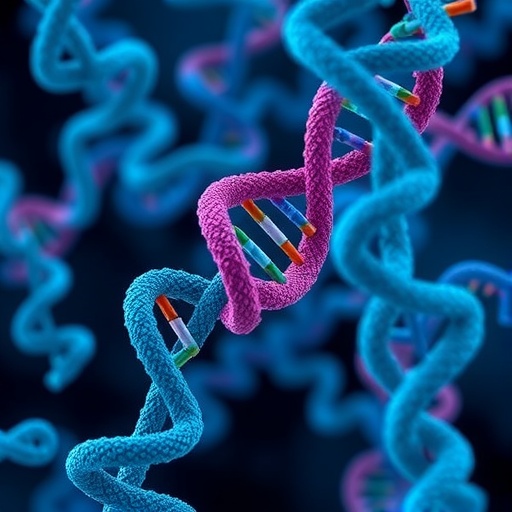In a pioneering advancement at the intersection of computational biology and genetics, researchers at Baylor College of Medicine have unveiled a sophisticated artificial intelligence (AI) model that elucidates the intricate connections between genetic mutations and disease through protein modifications. Termed DeepMVP, this innovative tool harnesses deep learning techniques to accurately predict post-translational modification (PTM) sites on proteins and assess how genetic variants can alter these crucial biochemical markers. The research, recently published in the prestigious journal Nature Methods, promises to transform our understanding of protein function regulation and its implications across a spectrum of diseases, ranging from cancer to neurological disorders.
Proteins serve as the fundamental workhorses of the biological system, orchestrating myriad cellular processes including tissue growth, metabolic regulation, and immune defense. However, the functionality of proteins is not solely determined by their amino acid sequence; it is extensively modulated by chemical modifications introduced after the protein has been synthesized. These modifications, collectively known as post-translational modifications, involve the covalent attachment of various chemical groups such as phosphates, sugars, or acetyl groups. These PTMs finely tune protein activity, stability, localization, and interactions, thereby dictating the broader cellular response and health outcomes.
PTMs represent critical regulatory nodes within the proteome, directing signaling pathways and cellular machinery in both normal and pathological states. Dysfunctional PTMs have been directly implicated in the etiology of numerous complex diseases, including malignancies, cardiovascular conditions, and degenerative neurological disorders. A mutation in the DNA sequence can disrupt normal PTM patterns by abolishing a modification site, creating ectopic sites, or perturbing the surrounding amino acid environment, thereby derailing protein function and precipitating disease. Therefore, precisely pinpointing PTM sites and understanding mutation-driven alterations are paramount to elucidating disease mechanisms.
Addressing this challenge, the Baylor research team led by Dr. Bing Zhang developed DeepMVP—a deep learning framework meticulously trained to identify PTM sites across the human proteome and predict how mutations reshape these sites. The model was constructed using a novel dataset named PTMAtlas, which represents a comprehensive and rigorously curated collection of 397,524 verified PTM sites derived from the systematic reanalysis of 241 publicly available proteomic datasets. Focusing on six prevalent PTM types, including phosphorylation and glycosylation, PTMAtlas provides a densely annotated resource that dramatically surpasses existing databases in both breadth and accuracy.
DeepMVP’s architecture leverages modern deep neural networks capable of discerning subtle sequence patterns indicative of PTM sites, integrating contextual biochemical properties to enhance predictive power. This approach enables not only precise site identification but also the assessment of how specific amino acid substitutions may enhance or diminish PTM occurrence. The model’s flexibility extends to non-human proteins, effectively predicting PTM sites in viral proteins such as those from the SARS-CoV-2 virus, highlighting its wide utility across biomedical research domains.
Benchmarking DeepMVP against eight state-of-the-art computational tools revealed a clear superiority in performance. Evaluation on a curated set of 235 experimentally validated mutation-PTM pairs demonstrated an impressive 81% accuracy in pinpointing exact PTM sites. More strikingly, DeepMVP correctly predicted the directional change—increase or decrease—of PTM levels caused by mutations in 97% of the cases. These results underscore DeepMVP’s effectiveness in interpreting the functional repercussions of genetic variation at the post-translational level.
The implications of DeepMVP’s predictive capabilities extend far beyond academic interest. By enabling a high-resolution view of how mutations perturb PTM landscapes, this tool offers a powerful platform for the identification of novel therapeutic targets and the design of precision medicine approaches. For example, in cancer biology, understanding aberrant PTM patterns linked to oncogenic mutations may drive the development of targeted inhibitors that restore normal cellular signaling. Similarly, in neurological and cardiovascular diseases, identifying mutation-induced PTM changes could illuminate pathophysiological processes hitherto obscured in genetic studies.
DeepMVP is freely accessible to the global research community, fostering collaborative efforts to exploit its potential across various health disciplines. This open-access availability ensures that scientists investigating disease genetics, drug discovery, and molecular biology can integrate DeepMVP predictions into their workflows, accelerating the translation of genetic insights into tangible clinical interventions.
Complementing the AI model, PTMAtlas stands as a monumental achievement, synthesizing extensive proteomic data into one unified framework. Its creation involved the harmonization of heterogeneous datasets, rigorous quality control measures, and sophisticated bioinformatic pipelines. This assembly provides an unprecedented foundation for future studies in proteomics, molecular evolution, and systems biology, enabling researchers to navigate the complexity of protein modifications with newfound clarity.
The Baylor team acknowledges significant support from various funding bodies, including the National Cancer Institute (NCI) and the Cancer Prevention and Research Institutes of Texas, underscoring the critical role of sustained investment in biomedical innovation. Additionally, computational resources such as the NVIDIA Titan Xp GPU facilitated the model’s training and optimization, reflecting the increasingly interdisciplinary nature of modern bioscience combining biology, computer science, and engineering.
Looking ahead, the researchers envision expanding DeepMVP’s capabilities to encompass additional PTM types and incorporating structural protein information to further refine predictions. Coupled with advances in high-throughput proteomics and functional genomics, such enhancements could revolutionize our capacity to decode the molecular underpinnings of human diseases.
In summary, the deployment of DeepMVP marks a seminal leap in the application of AI to biomedical research, offering a powerful avenue to decode the molecular grammar that links genetic variation to functional protein changes. This work not only deepens our understanding of cellular regulation at the molecular level but also propels the potential for innovative therapeutic strategies targeting post-translational modifications, thus opening new frontiers in precision medicine.
Subject of Research: People
Article Title: DeepMVP: deep learning models trained on high-quality data accurately predict PTM sites and variant-induced alterations
News Publication Date: 26-Aug-2025
Web References: https://www.nature.com/articles/s41592-025-02797-x
References:
Zhang, B., Wang, C., Wen, B., Li, K., Han, P., Holt, M. V., Savage, S. R., Lei, J. T., Dou, Y., Shi, Z., & Li, Y. DeepMVP: deep learning models trained on high-quality data accurately predict PTM sites and variant-induced alterations. Nature Methods, 26 August 2025. DOI: 10.1038/s41592-025-02797-x
Image Credits: Baylor College of Medicine
Keywords: Applied sciences and engineering, Applied mathematics, Computer science, Health and medicine




